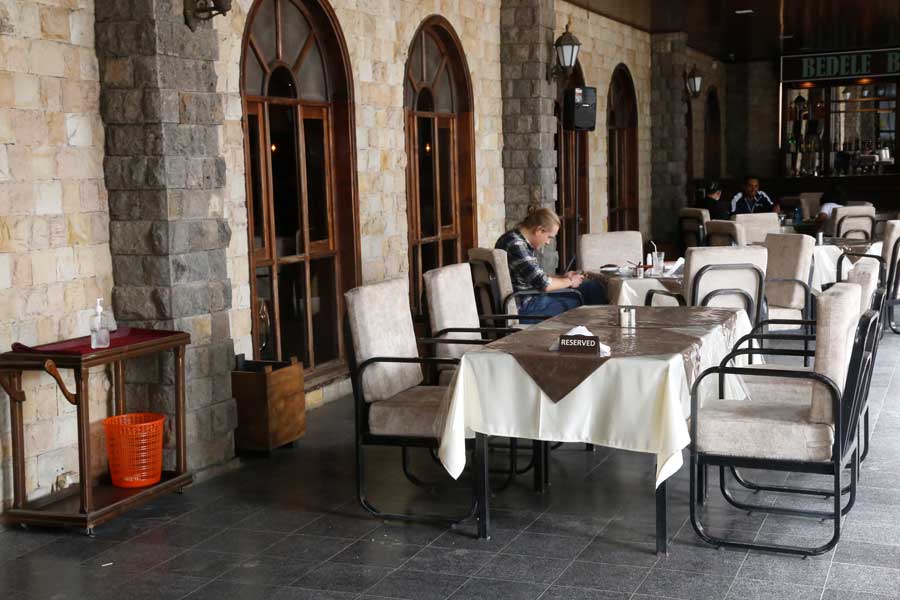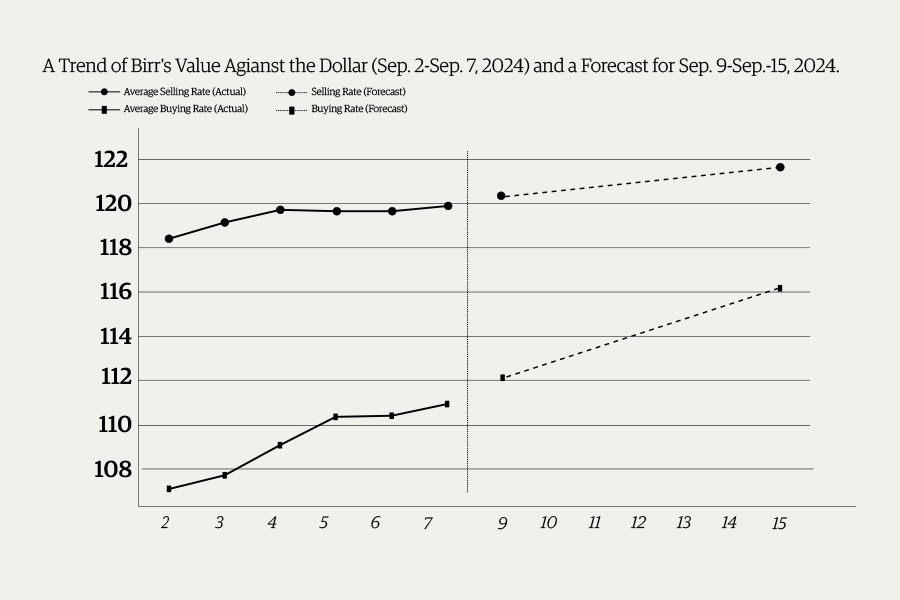
Life Matters | Dec 19,2021
A mere week ago one of the 11 branches of Tomoca Coffee, this one located in Piassa, had hundreds of people walk through its doors every day. But this is no longer the case.
Following the rising number of people testing positive for the Novel Coronavirus (COVID-19) and tighter health guidelines that are issued from authorities, the famous coffee roasting company had to close its doors for the first time since its opening almost seven decades ago.
When Tomoca opened its first shop in Ethiopia in 1953, people were only used to drinking coffee at their houses. Due to this trend, it took the company eight years to branch out until residents developed the habit of drinking coffee outside of their homes.
Typically, the coffee shop operates 11 branches in Addis Abeba and one in Bishoftu (Debre Zeit) and serves hundreds of customers a day, but that all changed last week.
On the afternoon of Tuesday, March 31, 2020, the two-storey dilapidated building in Piassa, home to Ethiopia’s first coffee shop, was empty. The sidewalk on the street outside is also mostly vacant. A few pedestrians pass every now and then.
The building where the coffee shop was first opened is now boarded up with shutters except for one window on the second floor.
The long-term plan involves opening up 100 branches over a 10-year time frame, according to Kiroubel Seyoum, COO of the company.
However, the management of the shop closed all of the branches as of March 28, 2020, as a contribution to stopping the spread of the virus. Before deciding to temporarily close the business, the managers let the staff work in shifts.
Essential personnel like security and delivery staff are still working, while the rest have been told to stay at home for the coming two weeks and wait this out.
Though the coffee shop roasts, packs and supplies coffee to supermarkets, and its coffee exports contribute close to 10pc of its overall revenue, its main customers are local residents of the capital.
The company spends over two million Birr a month on employee wages for its 300 direct and 500 indirect workers and another two million Birr for monthly rent payments. Though operations have ceased almost completely at the moment, its management is hopeful.
"We have no plans to lay off employees, and we're hopeful that we'll be back in business in two to three weeks," Kiroubel said.
Tomoca Coffee has since its closure decided it will open its branches in phases starting Monday, April 6,2020, acording to Kiroubel.
Gebeta Bar & Restaurant closed it doors on March 25,2020 as a precautionary step.
The spread of the virus, which has reached 35 individuals within three weeks, hit most of the of businesses in the country hard including the cafes and restaurants, which have been opening rapidly for the past couple of years.
The Addis Abeba Trade Bureau has given licenses to 388 new restaurants and 751 cafes just this year alone, bringing the total number of restaurants and cafes to 64,114 and 28,981 respectively.
Another long-standing business contemplating the same move as Tomoca is La Parisienne, one of the chain cafes in the capital, which has been in business since 1997. Started with a capital of 100,000 Br by a family of six, the cafe had its first branch at Olympia and now has a total of six branches across the city.
The cafe, famous for its croissants and boasting 220 employees and an annual turnover reaching up to 30 million Br, is facing a major decision. The café normally prints out close to 1,000 receipts a day, but as of late business has been slow.
"We barely print out 30 nowadays," says Yetna Teferi, one of the owners. "We're ready to close the shop."
The establishment has been operating at a loss for some time, and the only reason it is still open is that the owners have not been forced yet and didn't want to add to the confusion in the city, according to Yetna.
"However, given the situation," said Yetna, "that'll will likely change in the coming few days."
All the employees in the café are permanent, and the decision is to keep them for as long as it can, according to the owners, who also plan to close for a couple of weeks and take it from there. Most of the staff have taken their annual leave.
"We just have to pay them and see what happens in a few weeks," he said. "They have been working here a long time, and we don’t intend to disband them and restart the whole hiring process again in a month or so when we re-open."
If the company lays off its employees, it could possibly pay for up to seven months worth of salary to a single employee, summing up compensation and severance pay, according to the co-owner, who hopes that the government will provide support.
The four-year-old company Garden of Coffee is another victim of the current situation. It opened up its first branch of Café-Roasteries in the Bole Japan area, consuming up to 10 million Br in capital for its cafe, bathrooms, shower and changing rooms for staff and international roll-out. The investment also includes the machinery for production and packaging of their coffee, tefftastic chips and snacks that are made from teff.
The company has 180 employees including at its factory located in Torhailoch and had planned on expanding before the onset of COVID-19 in the country, according to its owner Bethlehem Tilahun.
It plans to open a new branch in Unity Park and eventually at over 100 new locations across China. An initial trial toward bigger exports, however, has come to a grinding halt, since the cafe has shut down all its branches and been forced to let go of all its employees.
This was done for a lot of reasons, according to Bethlehem.
"We don’t know how long this will go on. We're entrepreneurs, and we don’t have money on our hands," she said.
Bethlehem says that everything they have is invested in new projects, and they also have bank loans to pay and rent payments for their prime location that makes up to 40pc of their overall costs.
"We simply couldn't keep our employees without work," she said. "We had invested a lot in our employees as well, but in the end it is a matter of survival."
The Café-Roastery is now closed for an unspecified time, and even the owner does not know when it will open again.
"We need the government to help out grassroots entrepreneurs,” said Bethlehem.
Restaurants are also feeling the burn. Gebeta, a bar and restaurant that serves strictly Ethiopian cuisine, is among them. It had been open for five years until last Wednesday, March 25, when it closed its doors for the safety of its staff and patrons.
"I can’t tell my employees to show up at work when I’m at home social distancing,” said Selome Tadesse, its owner who is just as unsure of the situation.
It took three million Birr and three months of construction work on a previously residential villa to turn it into the spacious and plant adorned outdoor area that it is now. Gebeta, popular for its fasting buffet, was busy at lunch and dinner and used to sell close to 400 injera a day.
"We were on the lookout for new locations to open up new branches, because we understood the demand was there," says Selome.
Unfortunately, those plans had to be shelved for an unknown time in the future. The restaurant’s 40 employees are on paid leave at the moment as it chose to close its doors following the guidelines that have been passed by the Ministry of Health on social distancing and minimising contact.
Between rent and basic salaries, Gebeta spends over 350,000 Br a month, according to the owner.
“It was the better alternative for me,” says Selome. “Our staff takes public transportation to get to work and that’s a risk to them and the customers. The customers, in turn, are risks to my staff. The nature of the virus is very communicable, we use a lot of equipment in the kitchen, and it seemed like taking too many chances, so we have decided to close for now.”
Though the businesses have started closing doors on their owners' own initiative, the government proclaimed the closure of all schools and banned public gatherings. The public offices are still in operation with a small number of staff members to avoid physical contact, which is said to be the major factor in the spread of the virus.
Gebeta had initially closed for two weeks following this announcement, but the extension of the closure for another two weeks had Selome thinking that this may not be for as short as she had initially anticipated. Her patrons are asking for delivery services to resume and for the time being, even this is something she has yet to think about.
With the closure of businesses happening throughout the city, some, like Effoi pizza, have opted to just offer delivery for the time being.
The pizzeria stopped serving customers at all its four branches just last week and has resorted to doing delivery and take away. Its staff of 130 are working shifts and some are on their annual leave.
"We still pay salaries, but the amount of their income is greatly dependant on tips and commissions from sales, so it has a serious impact on them," said Tsega Woubishet, founder of the pizza chain.
“As for the pizzeria itself, it is operating at a loss, and it is more likely that we will completely close before opening up again," he said, "We're waiting to see what the support from the government will look like. At this point, profit taxes will be out of the question."
Most of the businesses call for an intervention from the government to relieve the financial burdens they are facing.
The Addis Abeba Tax Authority finalised the first draft of recommendations for tax relief packages and will send it to the City Administration to be announced by the deputy mayor early next week, according to Tilahun Girma, director for Planning & Budget at the Authority.
“Some of the recommendations give complete tax relief, while others are limited to percentages,” he added.
Tax relief plans are not that big of an issue, according to Matiwos Ensermu (PhD), associate professor at Addis Abeba University, School of Business & Economics.
Where there's no income, there's no tax, so what the government should be focusing on is giving a direct cash injection for the first two to three months, according to Matiwos.
"With this, the businesses are able to pay and keep their employees," he said. "This is something that we are witnessing in other parts of the world," he said.
The next step would preferably be availing soft loans to the businesses, according to Matiwos.
"If this isn't the case, then it will take a very long recovery time for the businesses, and we will also have to deal with the social disorder that employment will bring," he said.
PUBLISHED ON
Apr 04,2020 [ VOL
21 , NO
1040]

Life Matters | Dec 19,2021

Agenda | Sep 27,2020

Fortune News | May 06,2023

Covid-19 | Mar 31,2020

Letter To Editor | Apr 18,2023

Agenda | Nov 06,2021

Money Market Watch | Sep 08,2024

Fortune News | Jun 15,2025

Covid-19 | Apr 01,2020

Radar | Jan 07,2023

Dec 22 , 2024 . By TIZITA SHEWAFERAW
Charged with transforming colossal state-owned enterprises into modern and competitiv...

Aug 18 , 2024 . By AKSAH ITALO
Although predictable Yonas Zerihun's job in the ride-hailing service is not immune to...

Jul 28 , 2024 . By TIZITA SHEWAFERAW
Unhabitual, perhaps too many, Samuel Gebreyohannes, 38, used to occasionally enjoy a couple of beers at breakfast. However, he recently swit...

Jul 13 , 2024 . By AKSAH ITALO
Investors who rely on tractors, trucks, and field vehicles for commuting, transporting commodities, and f...

Jun 28 , 2025
Meseret Damtie, the assertive auditor general, has never been shy about naming names...

Jun 21 , 2025
A well-worn adage says, “Budget is not destiny, but it is direction.” Examining t...

Jun 14 , 2025
Yet again, the Horn of Africa is bracing for trouble. A region already frayed by wars...

Jun 7 , 2025
Few promises shine brighter in Addis Abeba than the pledge of a roof for every family...